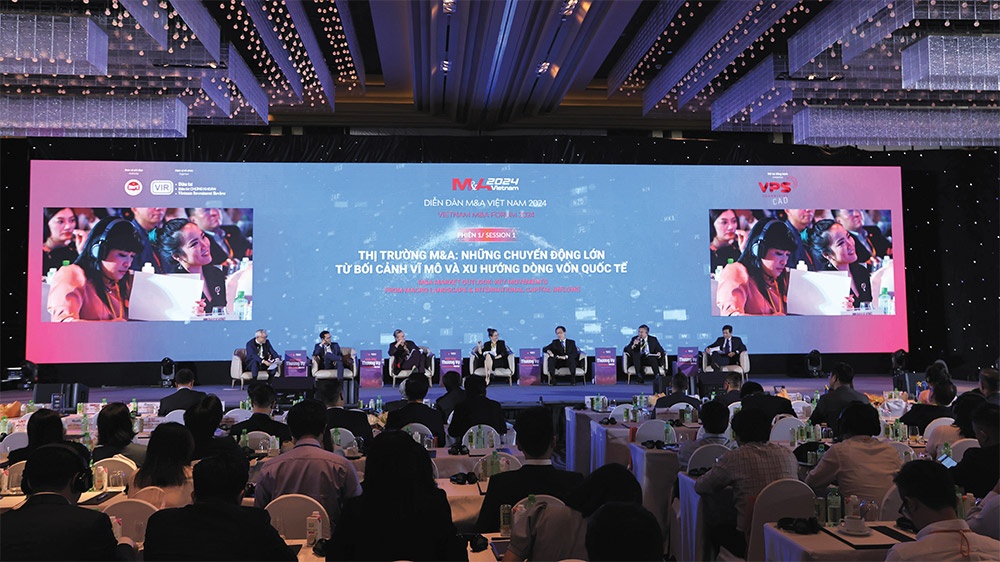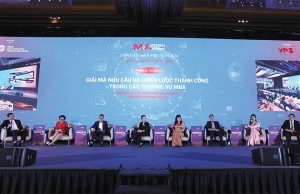Investors old and new take on M&As
 |
| Investors old and new take on M&As, Photo: Le Toan |
Last week, Thai renewable energy company BCPG Public Co., Ltd. announced that it signed a share purchase agreement worth nearly $130 million to invest in two wind power projects in the Central Highlands province of Gia Lai.
Niwat Adirek, president and CEO of BCPG, said, “The transaction is slated to be completed in the first quarter of 2025. Following the deal, the two wind power plants will be put into commercial operations immediately to generate cash flow for the company.”
On November 21, Japan’s Summit Agro International, a member company of Sumitomo Corporation, announced that it has scooped up a 49 per cent stake in Hop Tri Investment Corporation, a Vietnamese crop protection firm. The deal will enable Summit Agro International and its local subsidiary Summit Agro Vietnam to expand their products and services.
The previous month, Singapore telecommunications provider M1 Limited signed an agreement to acquire 70 per cent in ADG National Investment and Technology Development Corp, a prominent IT solutions provider based in Vietnam. Meanwhile, South Korean conglomerate SK Group has acquired a Vietnam-based semiconductor company, Iscvina Manufacturing, in a deal worth $300 million.
“Despite occasional fluctuations in position from year to year, investors from Japan, South Korea, Thailand, and Singapore are expected to maintain a strong and enduring presence in Vietnam’s M&A landscape,” said Vo Ha Duyen, chairperson of VILAF. “Its geographic proximity, high growth potential, young workforce, and increasing demand for infrastructure align well with the investment strategies of ASEAN neighbours and East Asian powerhouses.”
According to data by FiinGroup, investments from Thailand to Vietnam have shown significant momentum via M&A transactions in the first nine months of 2024, with Thailand reclaiming its leading investor in inbound activities with a mega deal worth $870 million between SCBX Group and Home Credit.
Singaporean investors remained in second position in terms of inbound such activities in Q1-Q3, contributing to 11 per cent of total inbound deal value, with a major concentration on the renewable energy sector. Particularly, Sembcorp is the largest investor in the period, accounting for 53 per cent of the total inbound deal value from Singaporean investors.
Baker McKenzie findings reveal that South Korea remains one of the top investors in Vietnam. In the first half of 2024 alone, South Korean investors contributed approximately $1.4 billion to the Vietnamese market, marking a 16 per cent on-year increase.
Meanwhile, Japan is among the most active foreign investors in Vietnam’s M&A market. In the first nine months of 2024, there were 14 publicly disclosed transactions between both nations, up from 12 in the same period in 2023, according to RECOF.
Besides strategic investors, there are more new players joining the scene. In March, liquefied natural gas (LNG) terminals and downstream infrastructure company AG&P, a subsidiary of Nebula Energy, announced that it acquired 49 per cent of Cai Mep LNG Terminal, located in the southern province of Ba Ria-Vung Tau.
Likewise, Chinese investors are also stepping up their dealmaking activities in Vietnam, such as CDH Investments’ backing of Bach Hoa Xanh.
Seck Yee Chung, partner of Baker McKenzie, said that increased competition from investors from the UAE, China, and other jurisdictions may create more competitive bidding scenarios, particularly in high-value sectors like energy, logistics, and infrastructure. These emerging investors bring significant capital, technology, and expertise, thereby pressuring traditional investors to offer more competitive deal terms and develop innovative investment strategies.
“As of 2024, China now ranks as the fifth-largest investor in Vietnam by deal size for the first time since 2021, whereas Japan has slipped out from the list,” Chung said. “Nevertheless, even as the yen depreciates, Japanese enterprises still continue to invest abroad, with Vietnam being a highly attractive option given its growth potential and opportunities, which is a trend that is likely to continue.”
Despite China’s extensive investment in Vietnam in 2024, Chinese backing is somewhat limited toward acquiring Vietnamese entities that have strong business relationships and customer portfolios in the USs and Europe, Chung added.
Meanwhile, the UAE and Vietnam recently signed a bilateral comprehensive economic partnership agreement. Of note under the agreement, the two governments call on the private sector of both countries to continue promoting and expanding trade and investment cooperation in the energy sector, including green and renewable energy, LNG, oil and gas production, refining, and petrochemicals.
Moving forward, Chung said, in 2025 Japan is expected to continue to invest in real estate, whereas China may explore opportunities in the financial services sector. The US is likely to pursue investments in the industrial and manufacturing sectors, and Singapore should remain strong across consumer-driven industries, he added.
 | More vigorous 2025 in sight for M&A deals Although the total value of deals in Asia is the lowest in a decade, the first nine months of 2024 recorded improvement in merger and acquisition (M&A) transaction value in Vietnam – a situation which will be built upon next year. |
What the stars mean:
★ Poor ★ ★ Promising ★★★ Good ★★★★ Very good ★★★★★ Exceptional
Related Contents
Latest News
More News
- South Korean VC completes buyout of Chicken Plus Vietnam (February 25, 2026 | 07:55)
- Marico buys 75 per cent of Vietnam skincare startup Skinetiq (February 10, 2026 | 14:44)
- Mitsubishi acquires Thuan An 1 residential development from PDR (February 09, 2026 | 08:00)
- KKR and Singtel step up data centre investment in Southeast Asia (February 06, 2026 | 13:09)
- New rules ease foreign access to Vietnam equities (February 05, 2026 | 17:29)
- Vietnam’s IFC creates bigger stage for M&As (February 01, 2026 | 08:16)
- Game startup Panthera raises $1.5 million in seed funding (January 29, 2026 | 15:13)
- Cool Japan Fund transfers shares of CLK Cold Storage (January 28, 2026 | 17:16)
- Nissha acquires majority stake in Vietnam medical device maker (January 26, 2026 | 15:40)
- BJC to spend $723 million acquiring MM Mega Market Vietnam (January 22, 2026 | 20:29)

 Tag:
Tag:



















 Mobile Version
Mobile Version